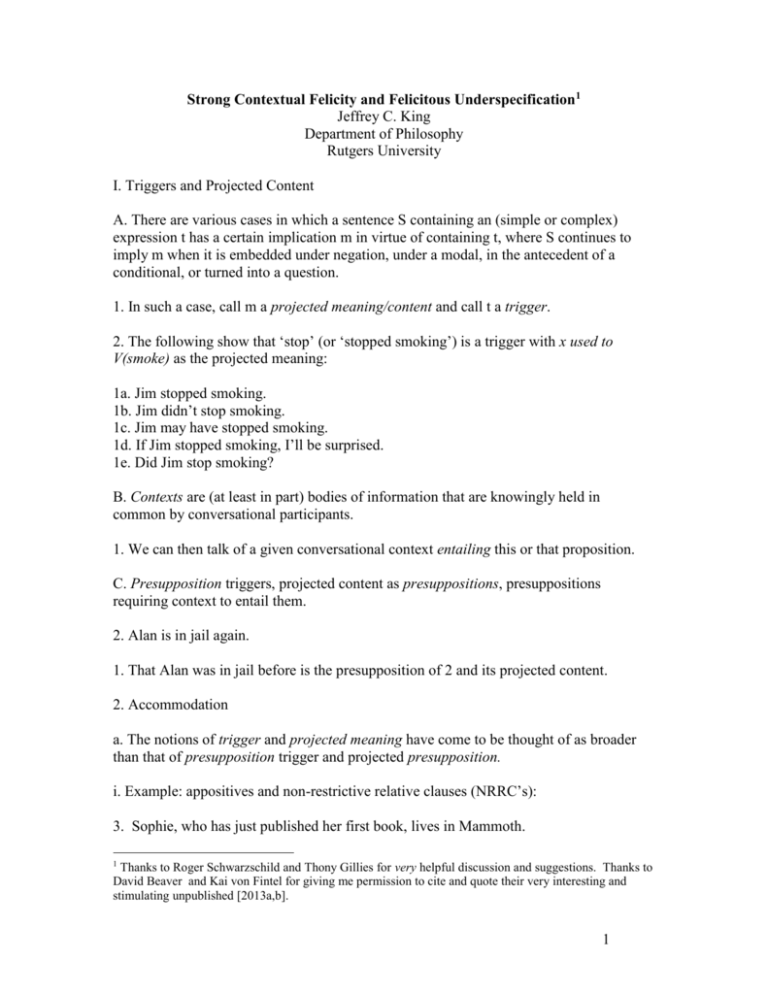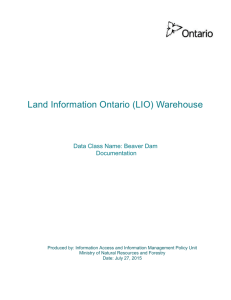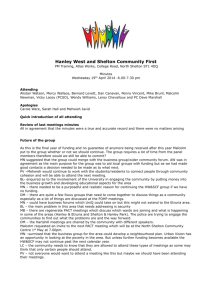Handout - Institut Jean
advertisement

Strong Contextual Felicity and Felicitous Underspecification1 Jeffrey C. King Department of Philosophy Rutgers University I. Triggers and Projected Content A. There are various cases in which a sentence S containing an (simple or complex) expression t has a certain implication m in virtue of containing t, where S continues to imply m when it is embedded under negation, under a modal, in the antecedent of a conditional, or turned into a question. 1. In such a case, call m a projected meaning/content and call t a trigger. 2. The following show that ‘stop’ (or ‘stopped smoking’) is a trigger with x used to V(smoke) as the projected meaning: 1a. Jim stopped smoking. 1b. Jim didn’t stop smoking. 1c. Jim may have stopped smoking. 1d. If Jim stopped smoking, I’ll be surprised. 1e. Did Jim stop smoking? B. Contexts are (at least in part) bodies of information that are knowingly held in common by conversational participants. 1. We can then talk of a given conversational context entailing this or that proposition. C. Presupposition triggers, projected content as presuppositions, presuppositions requiring context to entail them. 2. Alan is in jail again. 1. That Alan was in jail before is the presupposition of 2 and its projected content. 2. Accommodation a. The notions of trigger and projected meaning have come to be thought of as broader than that of presupposition trigger and projected presupposition. i. Example: appositives and non-restrictive relative clauses (NRRC’s): 3. Sophie, who has just published her first book, lives in Mammoth. 1 Thanks to Roger Schwarzschild and Thony Gillies for very helpful discussion and suggestions. Thanks to David Beaver and Kai von Fintel for giving me permission to cite and quote their very interesting and stimulating unpublished [2013a,b]. 1 II. Strong Contextual Felicity A. Recently, Tonhauser et al. [2013] and Beaver and von Fintel [2013a,b] have claimed that certain triggers impose particularly strict conditions on contexts. 1. Tonhauser et al. [2013], who call the effect Strong Contextual Felicity (SCF), put the point this way: Strong contextual felicity refers to a particular condition on the felicitous use of a trigger, namely, that it can be used felicitously only if some implication associated with the trigger is established in the utterance context. 2. Beaver and von Fintel [2013a] in quoting this passage add: What Tonhauser et al. mean by “utterance context” is the context “in which an utterance is produced”. It is not the context as it is modified by the utterance, which it might be for example if the utterance triggered “accommodation”. So, another way of looking at the phenomenon is that it concerns meaning ingredients that need to be satisfied by the prior context and cannot be rescued by accommodation. 3. The examples of SCF triggers that I will be concerned with at the outset are deictically used personal pronouns and (simple and complex) demonstratives. 4. Beaver and von Fintel [2013a]: 4. *He’s a piece of work. a. Beaver and von Fintel: “The problem is that there is no viable candidate for the reference of he.” i. The implication should be something like that the use of the pronoun refers to e, where e is some specific entity. ii. Call this proposition the reference implication. B. Attempted Derivation of SCF effects 1. Suppose pronouns come with phonologically null indices that are essentially variables. 2. Standard (textbook) semantics for pronouns: If i is a pronoun and g is a variable assignment and i is in the domain of g, then ||i||g=g(i). 2 3. The standard metasemantics for variables: contexts of utterance determine variable assignments giving rise to the following appropriateness condition: Appropriateness Condition A context c is appropriate for an LF only if c determines a variable assignment whose domain includes every index free in . 4. Call the standard semantics and metasemantics for pronouns above, SSMS. Suppose that an LF containing a pronoun i is uttered in c, where c together with SSMS (c+SSMS) does not entail that i has a referent (i.e. c+SSMS does not entail the reference implication for i). But then c+SSMS does not entail that c determines a variable assignment whose domain includes i. Hence, c+SSMS does not entail that c is appropriate for . So is infelicitous in c. 5. For ease of expression I’ll henceforth talk of pronouns not having a referent in a context c instead of talking of c not entailing that the pronoun has a referent. 6. The appeal to pronouns/variables here really isn’t crucial. a. What is crucial is that for a given contextually sensitive expression or construction, the metasemantics requires the context to fix a value for the expression/construction or the context will not be appropriate for the expression/construction. b. I call contextually sensitive expressions/constructions whose meanings alone do not suffice to secure semantic values in contexts, and so require some sort of supplementation in context to do so, supplementives. C. Beaver and von Fintel’s rejection of this explanation of SCF 1. If SCF effects are derivable from the metasemantics for variables, they should arise for all variables. 2. But Beaver and von Fintel [2013a,b] claim that they don’t. a. Three uses of variables: Pronouns exhibit all three uses: deictic: (pointing at Joe) ‘He is in town for a conference.’ anaphoric: ‘I met Joe for a beer last night. He is in town for a conference.’ bound: ‘Every friend of mine calls me when he is in town for a conference.’ b. Partee [1973]: tense exhibits all three uses, suggesting that tense involves a variable/pronoun-like expression: 3 deictic: (half an hour down the highway after leaving home) ‘I didn’t turn off the stove.’ anaphoric: ‘I left the house around noon. I didn’t turn the off stove.’ bound: ‘Whenever I left the house in those days, I didn’t turn off the stove.’ c. Assuming that tenses are variables, Beaver and von Fintel claim that they don’t give rise to SCF effects: Partee [1973] 5. John went to a private school. d. So here we have a variable that has not been assigned a specific value and yet there is no SCF effect. 3. Beaver and von Fintel mention another example of a supplementive being used felicitously but where it is not assigned a specific semantic value in context that is due to Schwarzschild [1999]: 6. Alex: Which syntacticians did you meet? Otto: I only met Stowell. a. What is excluded by only as uttered by Otto here? Presumably, meeting syntacticians at the party other than Stowell. b. Call this set of syntacticians the alternative set for 6 in context c (presumed to be the context of utterance). 4. Final example Beaver and von Fintel [2013a] consider of a supplementive not receiving a unique semantic value in context: 7. The table is covered with books. D. Beaver and von Fintel [2013a,b] conclude that some variables, and more generally some supplementives, give rise to SCF effects and some don’t. 1. Positive view: two kinds of variables. a. One kind gives rise to SCF effects and one doesn’t. III. Supplementives and SCF A. I have recently been defending a metasemantics that I claim applies to all supplementives. 4 1. The metasemantics is of the sort mentioned above: it claims that a context is inappropriate for an LF if it doesn’t assign a value in the context to a supplementive in the LF. B. Plan: argue the following points 1. All supplementives give rise to SCF effects, contrary to what Beaver and von Fintel claim. 2. All supplementives have felicitous uses in which they have not been assigned specific semantic values, contrary to von Fintel and Beaver. 3. The fact that supplementives have felicitous uses in cases in which they lack a specific semantic value in context requires adjusting the appropriateness condition. IV. All supplementives give rise to SCF effects A. Consider Beaver and von Fintel’s [2013a,b] most dramatic examples of variables giving rise to SCF effects: personal pronouns: 4. *He’s a piece of work. 1. This is an “out of the blue” utterance of 4, where “there is no viable candidate for the reference of ‘he’.” 2. Call such cases catastrophic semantic value failures or catastrophic failures for short. 3. So Beaver and von Fintel’s 4 and similar examples show that in cases of catastrophic failure, pronouns exhibit SCF effects. B. However, it appears that all supplementives exhibit SCF effects in cases of catastrophic failure. C. Relational expressions that take implicit arguments. 8. *Sophie is ready. 1. Catastrophic failure and severe infelicity; and so SCF effects. D. ‘Only’ 9. *Only Mary passed the bar exam this year. 1. Again, here we get catastrophic failure, infelicity and so SCF effects. E. Possessives. 5 10. *Susie’s car is fast. 1. Catastrophic failure, infelicity and SCF effects. F. Quantifier domain restriction. 11. *Everyone went to Dubrovnik. 1. Catastrophic failure, infelicity and SCF effects. G. First “hard case”: tense 1. Partee’s [1973] example again: 5. John went to a private school. 12. *It will rain in the Mojave Desert. 13. *My car ran out of gas. 2. In both cases here we appear to get catastrophic failure and at least some degree of infelicity. H. Second “hard case”: gradable adjectives. 1. Gradable adjectives show the least extreme SCF effects of any construction. 14. Put a check above any number that is large. 2. Claim: this order crashes for me in the sense that I have no idea what to do. I. To repeat, then, all the supplementives I’ve considered give rise to SCF effects. 1. We just need to consider cases of catastrophic failure of the sort Beaver and von Fintel [2013a,b] used to illustrate how pronouns show SCF effects. V. Beaver and von Fintel’s examples of Felicitous Underspecification A. All supplementives have felicitous uses in (some) cases in which they have not secured unique semantic values in context. 1. Call a case in which a supplementive can be used felicitously in a context without having a specific semantic value in that context a case of felicitous underspecification. 6 2. Beaver and von Fintel have already claimed that there are cases of felicitous underspecification involving tense, ‘only’ and quantifiers. I accept those conclusions. 3. However, the cases of felicitous underspecification that Beaver and von Fintel consider do not involve catastrophic failure. B. Beaver and von Fintel’s tense example 1. Partee [1973] again: 5. John went to a private school. C. Beaver and von Fintel’s quantifier domain example 7. The table is covered with books. D. Beaver and von Fintel’s ‘Only’ example The example involving Stowell and the party due to Schwarzchild [1999]: 6. Alex: Which syntacticians did you meet? Otto: I only met Stowell. 1. Much more mundane cases appear to work in the same way. a. Suppose we walk into a restaurant and go to use the bathrooms before we sit down. The men’s room is locked and you go into the women’s room. You come out and I am still waiting. I say hopefully ‘He’ll come out soon.’ F. So none of Beaver and von Fintel’s [2013a,b] examples of supplementives in cases of felicitous underspecification is a case of catastrophic failure. VI. All supplementives allow for cases of felicitous underspecification A. Gradable adjectives: 15. Yesterday was cold. B. Possessives 16. Sophie’s skis are really working for her. C. Relational expressions taking implicit arguments. 17. Molly is ready. 7 D. First “hard case”: demonstratives 19. That is a beautiful shirt. 19a. I know! I bought it last week. 19b. Oh, but it has a spot on it! 20. You’ll need to wash that before you eat it. 21. Do you know what this is? 21a. Yes, it is a photograph of the new Chinese stealth fighter. How in the world did you get this? 21b. Yes, it is the new Chinese stealth fighter. How in the world did you get a picture of it? E. Second “hard case”: singular pronouns 22. He’s shadowing us again. 23. Are you kidding me? He didn’t show up again!#? 23a. Well, it turns out they never even got our email request this time. 24. You’ll need to wash it before you eat it. G. I’ve now argued that all supplementives I have considered have felicitous underspecified uses and display SCF effects. VII. Two remaining questions. A. First, though supplementives exhibit similar behavior in exhibiting SCF effects and allowing cases of felicitous underspecification, there are differences in how supplementives behave in these respects. 1. This needs explanation. 2. A summary of my judgments about the differences in behavior of supplementives: CF FU SCF Pronouns/demonstratives easy hard severe Relational expressions fairly easy not too hard severe -2 Possessives fairly easy not too hard severe ‘Severe –‘ indicates that the SCF effects are less severe than the case of pronouns, but still pretty severe. See examples 8-11. 2 8 ‘Only’ Quantifiers Tense Gradable adjectives fairly easy fairly easy hard hard not too hard not too hard easy easy severe severe mild mild 3. My hope is that these differences can be explained by invoking the conversational purposes and roles the various expressions typically play. B. Second, I mentioned above that the metasemantics I favor holds that a context is inappropriate for an LF if a supplementive in the LF is not assigned a unique semantic value in the context. 1. But this means that cases of felicitous underspecification are cases in which sentences/LFs are felicitous in inappropriate contexts. 2. That seems like a bad thing, given that the appropriateness condition seems intended to explain infelicity: when a context c is inappropriate for an LF , should be infelicitous in c. 3. To reformulate the Appropriateness Condition, we must distinguish two things: 1) the de facto degree of resolution our metasemantics determines for a supplementive in context c; and 2) the proper degree of resolution determined for that supplementive in c given conversational aims and goals in c. 4. Using 1 and 2, we can reformulate the appropriateness condition as follows: Appropriateness Condition Context c is appropriate for LF only if the degree of resolution in c of every supplementive in is proper according to c. 9







